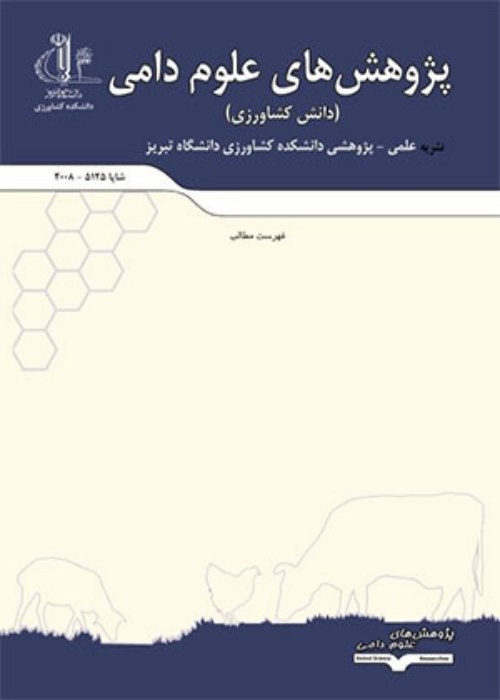Effect of pelleting on the chemical composition, nitrogen fractions and degradability characteristics of a commercial concentrates by two in vitro method
Author(s):
Article Type:
Research/Original Article (دارای رتبه معتبر)
Abstract:
Introduction
In this experiment the chemical composition, nitrogen fractions, degradation characteristics and gas production of raw and pelleted concentrate were determined. Food processing is one of the most important factors affecting feed intake and digestibility of feed which may be used to optimize fermentation and digestion (Dann et al. , 1999). Cereal processing can make optimal use of them, reduce nutrient losses, and also make livestock more balanced, which is very important in animal nutrition management. The aim of this study was to determine the effect of pelleting on the chemical composition, nitrogen fractions and degradability characteristics of commercial concentrates by two in vitro methods. Material and
methods
This study was carried out at the Research Farm, Faculty of Agriculture, University of Birjand, Iran. In order to prepare experimental treatments, concentrate samples were prepared in three stages. Step mash concentrates or Mash that was not inserted into pelleted machine, conditioner stage or phase that concentrates flour inside the machine under the influence of water vapor was 80-70 ° C and the third stage when the concentrates from the crossing conditioner cooled and turned into pellets. The treatments were: 1. mash concentrates before pelleting, 2. mash concentrates that has received heat and the pass conditioner and 3. Heated and pelleted concentrates. Degradability parameters of the samples were measured after incubation for 0, 2, 4, 8, 16, 24 and 48 hours in the rumen of two fistulated Holstein cows. The DM and CP degradation data were fitted by exponential equation P=a+b (1-e–ct). Effective degradability (ED) were calculated using of equation ED = a + { (cb) / (c + k) } and taking into consideration passing rate (k) 0. 02, 0. 05 and 0. 08 per hour. The gas production was recorded after 0, 2, 4, 6, 8, 12, 24 and 48 h of incubation. The data at the different times was analyzed using completely randomized design.
Results and discussion
The results showed the pellet process had no appreciable change on chemical composition (DM, CP, Fat, Ash, NDF, ADF) of concentrate. The non-protein nitrogen (NPN) decreased under the influence of heat processing. Neutral detergent insoluble nitrogen (NDIN) increased under the influence of heat processing (P<0. 05). Acid detergent insoluble nitrogen (ADIN) also increased under the influence of heat process but no significant difference observed. The lowest NPN was observed in heat-pelleted concentrate. Pellet heating caused a significant reduction in part b of dry matter and crude protein commercial concentrates. The rate of degradability in crude protein was associated with a significant reduction. There was a significant difference between the mean degradability coefficients and the effective degradation of crude protein under the influence of heat process. The highest mean slow part of degradation was observed in control treatment (0. 7360). Significant difference was observed between treatments in terms of fixed rate of degradability (P <0. 05), but there was no significant difference between two and three treatments. Pellet heating reduced part with the potential gas production that confirmed the results of the nylon bags method. According to the obtained data in this study, short chain fatty acid (SCFA), metabolizable energy (ME) and digestible organic matter (DOM) of experimental treatments showed significant differences (P<0. 05). Conclusions: It was concluded that pellet heating reduces the dry matter and crude protein degradability, especially in both gas production and nylon bag technique. Therefore heat process during pelleting concentrate is a good strategy to reduce ruminal degradability of concentrate and supply bypass protein requirement of dairy cows.
Keywords:
Language:
Persian
Published:
Journal of Animal Science Research, Volume:28 Issue: 2, 2018
Pages:
35 to 50
magiran.com/p1895962
دانلود و مطالعه متن این مقاله با یکی از روشهای زیر امکان پذیر است:
اشتراک شخصی
با عضویت و پرداخت آنلاین حق اشتراک یکساله به مبلغ 1,390,000ريال میتوانید 70 عنوان مطلب دانلود کنید!
اشتراک سازمانی
به کتابخانه دانشگاه یا محل کار خود پیشنهاد کنید تا اشتراک سازمانی این پایگاه را برای دسترسی نامحدود همه کاربران به متن مطالب تهیه نمایند!
توجه!
- حق عضویت دریافتی صرف حمایت از نشریات عضو و نگهداری، تکمیل و توسعه مگیران میشود.
- پرداخت حق اشتراک و دانلود مقالات اجازه بازنشر آن در سایر رسانههای چاپی و دیجیتال را به کاربر نمیدهد.
In order to view content subscription is required
Personal subscription
Subscribe magiran.com for 70 € euros via PayPal and download 70 articles during a year.
Organization subscription
Please contact us to subscribe your university or library for unlimited access!


